I am currently working on a ultrasonic sensor (and Temperature but that is not important for this question) on my raspberry Pi, This is how I got it set up due to space constraint I am unable to use a breadboard. I have used the ultrasonic sensor before on a Arduino and it was working perfectly fine but I am new to raspberry and python coding so please do correct me if there is anything wrong with what I am doing.
Edit
Yes, I did solder the resistor to the Raspberry Pi it self as the board is only used for this function.
Below is the script that I am using to calculate the distance, it takes the reading of the last 10 value and calculate the average of said values.
import RPi.GPIO as GPIO
import time, sys
import statistics
GPIO.setmode(GPIO.BCM)
log=__import__("logger")
TRIG = 23
ECHO = 24
log.log("Settng up Distance module...","distance.py")
GPIO.setup(TRIG,GPIO.OUT)
GPIO.setup(ECHO,GPIO.IN)
history=[]
total=0
count=0
distance=0
avg=0
dist=[]
distlist=[]
scan=False
GPIO.setmode(GPIO.BCM)
TRIG = 23
ECHO = 24
GPIO.setup(TRIG,GPIO.OUT)
GPIO.setup(ECHO,GPIO.IN)
def status():
history=[]
starttime=time.time()
for i in range(10):
GPIO.output(TRIG, False)
time.sleep(0.1)
#print("Waiting for sensor to settle...")
#print("Please wait...")
# ==========
# GPIO Setup
# ==========
GPIO.output(TRIG, True)
time.sleep(0.00001)
GPIO.output(TRIG, False)
#print("Sending...")
start=time.time()
pulse_start=start
while GPIO.input(ECHO)==0 and pulse_start-start<=0.0005:
pulse_start=time.time()
if round(pulse_start-start,3)>=0.300:
print(timeout)
else:
#print("Receiving...")
pulse_end=0
pulse_duration=0
while GPIO.input(ECHO)==1 and pulse_duration<2:
pulse_end=time.time()
pulse_duration=pulse_end-pulse_start
#print("Measuring...")
pulse_duration=pulse_end-pulse_start
# ====================
# Calculating Distance
# ====================
distance=pulse_duration*17150
distance=round(distance,2)
history.append(distance)
validcount=0
total=0
print(history)
for i in history:
if i<150:
validcount+=1
total+=i
if validcount>1:
avg_dist=round(total/validcount,2)
print("Average distance:",avg_dist)
if avg_dist<=50:
return([avg_dist,True,avg_dist,avg_dist])
else:
return([avg_dist,False,avg_dist,avg_dist])
else:
print("Timeout")
return([999,False,999,999])
while True: print(status()); time.sleep(1)
Below are the readings that I got from the sensor when I am standing close to it.
Average distance: -4590081542678.66
[-4590081542678.66, True, -4590081542678.66, -4590081542678.66]
[185.12, 341.6, 17.71, 188.05, 185.94, 185.55, 188.08, 185.58, 184.6, 185.09]
Timeout
[999, False, 999, 999]
[185.58, 186.09, 185.2, 184.4, 185.11, 185.6, 185.56, 186.47, 186.81, 187.24]
Timeout
[999, False, 999, 999]
[187.71, 186.07, 185.59, 185.6, 185.12, 185.61, 185.56, 186.83, 186.41, 184.68]
Timeout
[999, False, 999, 999]
[2243.37, 2245.42, 22.79, 24.57, 2245.48, 2243.77, 2245.33, 2245.12, 2245.18, 2245.28]
Average distance: 23.68
[23.68, True, 23.68, 23.68]
[2244.04, 2246.04, 348.54, 348.56, 348.58, 349.46, 349.44, 348.51, 350.32, 348.05]
Timeout
[999, False, 999, 999]
[348.65, 104.17, 103.76, 100.39, 348.94, 99.49, 348.99, 348.5, 348.14, 348.59]
Average distance: 101.95
[101.95, False, 101.95, 101.95]
[2244.2, 2245.87, 2246.03, 2246.21, 2243.82, 2246.09, 2245.4, 2245.17, 2245.98, 2245.81]
Timeout
[999, False, 999, 999]
[2243.19, 2245.8, 2245.89, 2245.82, 2245.66, 2245.76, 2245.65, 2245.69, 2245.58, 2245.89]
Timeout
[999, False, 999, 999]
[2242.55, 2245.85, 25.14, 24.11, 23.9, 23.2, 2243.35, 2246.04, 2246.33, 2245.93]
Average distance: 24.09
[24.09, True, 24.09, 24.09]
[2243.13, 19.03, 18.33, 17.64, 2246.25, 2244.32, 2245.29, 2245.44, 2245.78, 2246.06]
Average distance: 18.33
[18.33, True, 18.33, 18.33]
[2242.59, 2245.8, 2245.47, 2245.62, 2245.73, 2245.8, 2245.86, 2246.05, 2246.22, 2245.91]
Timeout
[999, False, 999, 999]
[2243.81, 2246.36, 2246.1, 2246.07, 2246.09, 2246.05, 2246.13, 2245.92, 2246.07, 2246.3]
Timeout
[999, False, 999, 999]
[2243.94, 2246.02, 2246.03, 2246.21, 2246.15, 2245.89, 2245.9, 2245.99, 2245.96, 2245.99]
Timeout
[999, False, 999, 999]
[2242.87, 2245.97, 18.78, 17.93, 17.81, 2243.93, 2246.01, 2245.86, 2245.95, 2246.04]
Average distance: 18.17
So what my program does is take the last 10 digits from the sensor and calculate the average of that value in the list but as you can see even when I am standing close to it the readings are over the range of THOUSANDS.
I am aware of this questionDistance Sensor (HC-SR04) Recording Inconsistent Values page and while it did give me insight to the problem it is unfortunate no solution has been found.I am speculating however that the problem lies in the pulse triggered for over 6 seconds which results in a high value as mentioned in the linked page but I am unsure if that's the only problem or how to fix it.
I would appreciate any feedback, suggestion or answer. Thank you in advance.
